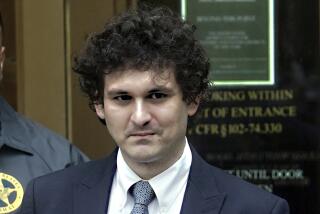Fastows Agree to Plea Deal
- Share via
HOUSTON — Andrew S. Fastow, architect of the financial schemes that plunged Enron Corp. into bankruptcy, will admit guilt today in a plea bargain deal that will send him and his wife, Lea, to prison.
The former Enron chief financial officer will serve 10 years, and his wife, once an assistant treasurer at the failed energy trading company, will be behind bars for five months, according to an attorney for Lea Fastow and a government official with knowledge of the case.
Andrew Fastow is the highest-ranking executive to be charged in the Enron investigation. His cooperation is considered crucial if prosecutors are to make a criminal case against former Enron Chairman Kenneth L. Lay and former Chief Executive Jeffrey K. Skilling.
Investigators identified Fastow as the mastermind of the complex off-balance-sheet deals that concealed debt and enabled the company to generate questionable profit.
Mike DeGeurin, lead attorney for Lea Fastow, said late Tuesday that his client would appear before U.S. District Judge David Hittner this afternoon to present a guilty plea. Andrew Fastow will plead guilty today before U.S. District Judge Kenneth Hoyt, DeGeurin said.
John Keker, Andrew Fastow’s attorney, didn’t return a call for comment late Tuesday.
Justice Department officials declined to comment. But the government official confirmed that both Fastows were expected to plead guilty today.
“The deal is back on,” the official said. “Details will be disclosed tomorrow in court.”
The plea agreement is similar to one that fell apart at the 11th hour last week, the official said.
That deal collapsed after Lea Fastow refused to accept a condition, set by Judge Hittner, that would have allowed him to impose a tougher sentence after the release of a pre-sentencing report in about two months.
Lea Fastow now has apparently agreed to accept this condition. DeGeurin on Tuesday wouldn’t comment on this apparent reversal of course. In the past, DeGeurin has said that the Fastows’ priority was to stagger their prison sentences so that their two sons, ages 5 and 8, would never be without a parent at home.
Andrew Fastow is charged with 98 counts of conspiracy, fraud, insider trading, money laundering, obstruction of justice and other felonies. He is accused of reaping at least $30 million in illegal profits through a series of off-the-books partnerships created to burnish Enron’s financial statements.
Lea Fastow, accused of helping her husband conceal the true nature of one partnership, is charged with six counts of conspiracy and filing false tax forms.
The news of the Fastows’ plea plans reignited speculation that the investigation could finally travel to the doorsteps of Lay and Skilling, neither of whom has been charged.
“The real question is whether this will lead to a Pandora’s box or whether it will just be a continuation of this saga,” said Rodney Ellis, longtime Democratic state senator from Houston.
Mimi Swartz, coauthor of last year’s book “Power Failure: The Inside Story of the Collapse of Enron,” agreed.
“It doesn’t look good for Skilling and Lay,” she said. “This was the best plea Fastow was going to get. He fought and fought and fought. Houston society is just as happy to see him go to jail as anybody else, because they lost money -- and in Houston, that’s the cardinal sin.”
Attorneys for Lay and Skilling couldn’t be reached for comment.
It wasn’t immediately clear late Tuesday whether Andrew Fastow had agreed to help authorities. Sherron Watkins, a former Enron manager and whistle-blower who lost $300,000 in her 401(k) retirement plan, however, was betting that cooperation was part of the new deal.
“I think he’ll bring Skilling with him,” she said.
Enron, once the world’s largest energy trader, filed for bankruptcy protection in December 2001 after disclosing huge losses from the off-the-books partnerships.
Accounting ploys designed by Fastow and others were used to produce 96% of the company’s reported profit during 2000 and to keep nearly $12 billion in debt off its books, according to a report issued in November by Neil Batson, an examiner appointed by the U.S. Bankruptcy Court in New York.
Enron’s auditor, former Big Five accounting firm Arthur Andersen, signed off on the controversial maneuvers and paid the ultimate price: It went out of business after being convicted of obstruction of justice.
Lay, who has a doctorate in economics, has portrayed himself as clueless about the true financial state of the company he headed. Skilling, the former chief executive, had more day-to-day dealings with Fastow.
Calvo reported from Houston, Meyer from Washington and Rivera Brooks from Los Angeles. Staff writer Thomas S. Mulligan contributed to this report.
More to Read
Inside the business of entertainment
The Wide Shot brings you news, analysis and insights on everything from streaming wars to production — and what it all means for the future.
You may occasionally receive promotional content from the Los Angeles Times.










